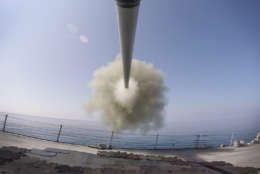National & World Headlines
-
The Defense Department has acquired a few hundred copies of its F-35 joint strike fighter and there's more in the 2017 budget. But the development phase of the expensive aircraft actually has not ended. In fact, this phase hasn't stopped slipping further into the future — 17 years after it started. The latest look-see from the Government Accountability Office details the implications. Michael Sullivan, director of acquisition and sourcing issues at GAO, shares the details on Federal Drive with Tom Temin.
May 12, 2017 -
Flashbacks can often be scarey, reminders of things we want to forget, but Senior Correspondent Mike Causey's recent visit to Fort Belvoir triggered a magic blast from the past.
May 12, 2017 -
The Marine Corps updated its separation policy in wake of the Marines United scandal.
May 11, 2017 -
The Contractor Performance Assessment Reports System (CPARS) is one of the Defense Department's most potent weapons for dealing with poor performing companies. But sometimes contracting officers make erroneous judgments and enter them into CPARS. Then what? Contractors can sue. But procurement attorney Joseph Petrillo of Petrillo and Powell tells Federal Drive with Tom Temin that even if they win the case, they don't really win.
May 11, 2017 -
In today's Federal Newscast, DoD's inspector general found the department complied with only one of the six requirements of the act by reporting improper payment rates of less than 10 percent.
May 11, 2017 -
Butch Luckie, the Air Force’s chief of IT business analytics, said the service is doing a better job capturing software and hardware asset data to help make better buying decisions.
May 11, 2017 -
Senate Armed Services Committee Chairman John McCain (R-Ariz.) laid the weight of DoD's first audit squarely on the shoulders of David Norquist, President Trump's pick for DoD comptroller. The department hasn't been audited in 17 years, and has spent the past seven engaged in audit-readiness preparations.
May 10, 2017 -
The new chairman and ranking member of the House Armed Services Personnel Subcommittee tell Federal News Radio what they are thinking for the next NDAA.
May 09, 2017 -
The secretive Pentagon organization that’s in charge of turning existing weapons systems into new warfighting concepts says it has a perfect track record so far. The military services have accepted all six of the technologies the Strategic Capabilities Office has offered up.
May 08, 2017 -
Preliminary analysis by the Aerospace Industries Association (AIA) shows the number of new regulations agencies and vendors must adhere to has increased from 16 to 142 since 2009.
May 08, 2017 -
The Defense Information Systems Agency has set up an approach for customers to send money to a working capital fund to pay for cloud services based on usage.
May 08, 2017 -
A U.S. Supreme Court ruling in the case of an autistic student has many observers anticipating more challenges over the level of special education services in schools
May 06, 2017 -
The Nationals celebrated the Navy this week at Nationals Park. Check out all the sights.
May 05, 2017 -
The Senate Armed Services Personnel Subcommittee is preparing its provisions for the 2018 defense authorization bill and this week it heard from some former top DoD officials. Family life seemed to be the bottom line for a lot of military issues. Employees want to be able to move between the civilian and military world, they want quality childcare for their children and they want their spouses to be happy and be able to work where they are stationed.
May 05, 2017 -
The Defense Department's Strategic Capabilities Office has managed to successfully transition all six of the weapons systems it's developed into programs of record that are now controlled by the military services. The secret to its success, according to the SCO's director, is its insistence on prototyping.
May 05, 2017















